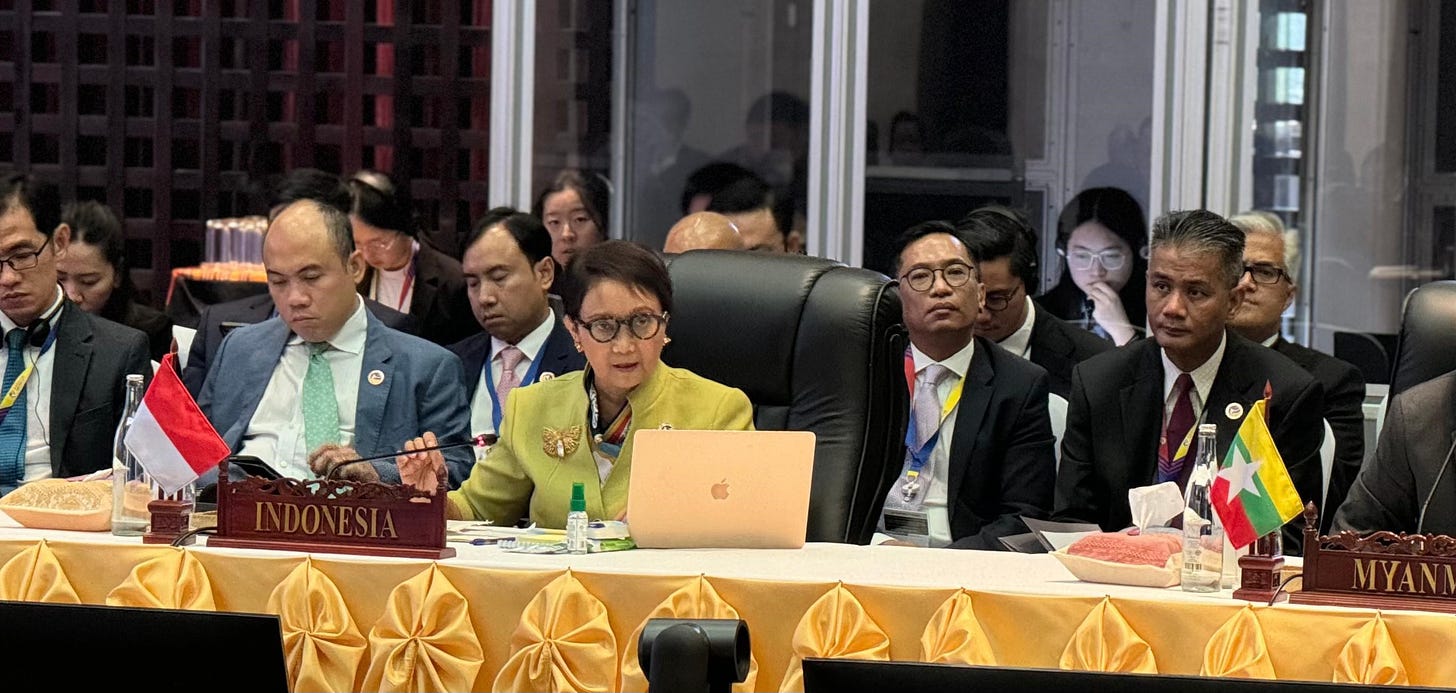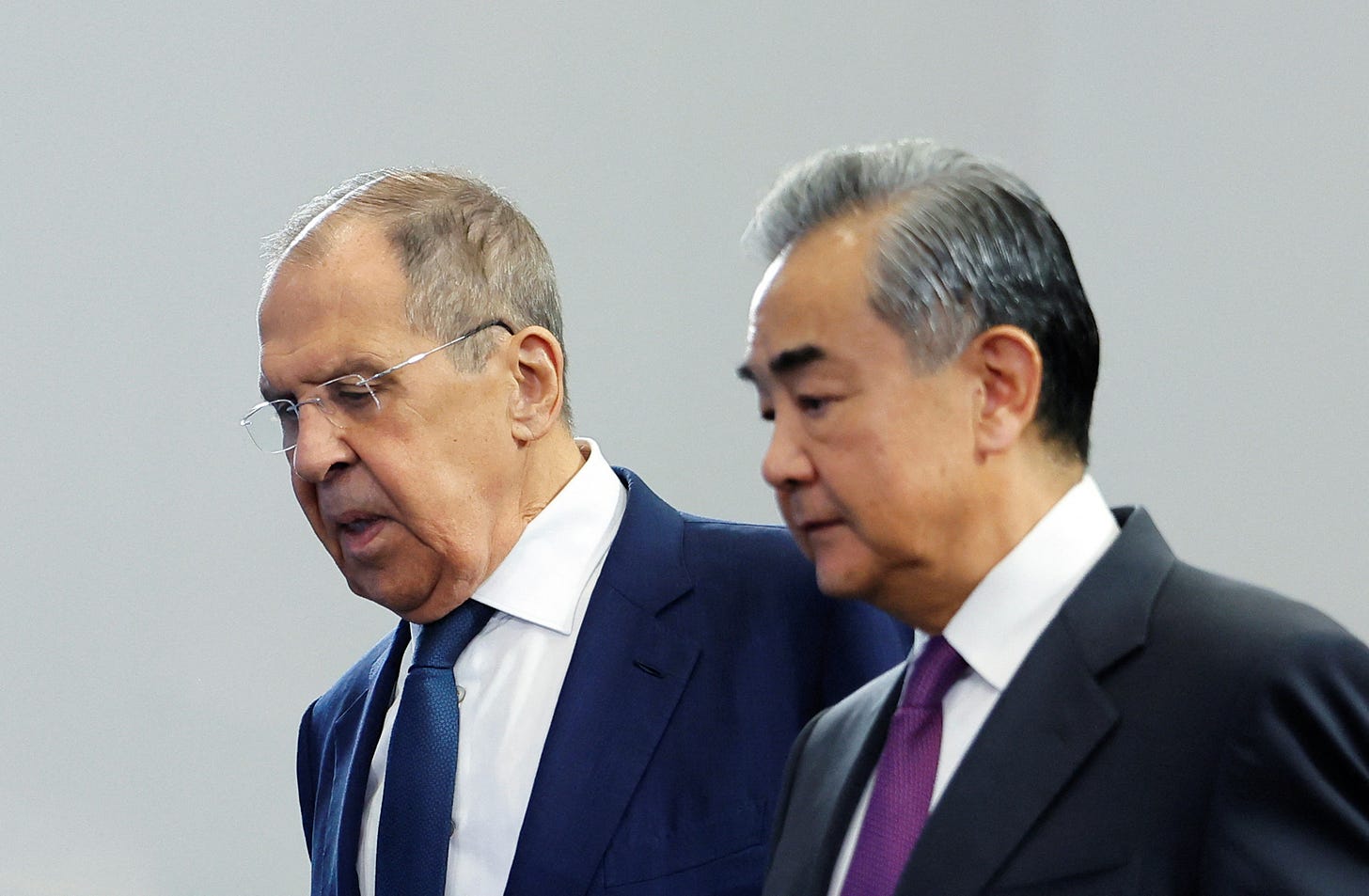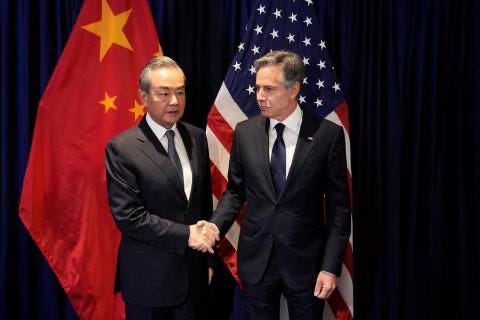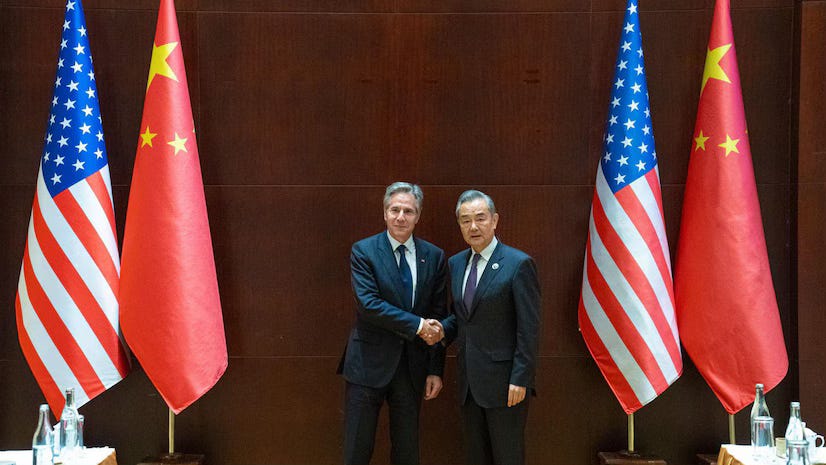ASEAN Peace Moves
Wang Yi and Sergei Lavrov work on peace, Indonesia promotes ASEAN +3 , China urges U.S. to manage risks, handle differences, Mahoney on ASEAN Foreign Ministers Summit
Indonesia Promotes ASEAN +3
Indonesia Urges ASEAN Plus Three to Become the Cornerstone of Regional Stability and Growth
Source: Ministry of Foreign Affairs
Vientiane, Lao PDR – Indonesian Foreign Minister, Retno L.P. Marsudi attended the ASEAN-Plus Three (APT) Foreign Ministers' Meeting in Vientiane, Laos, on Saturday (27/7). In her statement, Minister Marsudi emphasized the crucial role of the APT in continuing to be a strong anchor for ensuring peace, stability, and prosperity in the region.
Minister Marsudi highlighted two primary objectives that APT should focus on.
First, being a positive contributor to peace.
With a stable economic growth rate of 4.5%, ASEAN contributes significantly to global economic expansion. ASEAN also has the third-largest population in the world, with half of its population being youth.
“This significant ASEAN demographic would be meaningless if peace and stability are not maintained," said the Foreign Minister.
In this regard, ASEAN Foreign Ministers appreciated the Plus Three countries' commitment to fostering dialogue to bridge differences during the Trilateral Meeting.
The Plus Three countries (South Korea, China, Japan) also expressed support for the ASEAN Outlook on the Indo-Pacific (AOIP) as an inclusive regional platform. APT Foreign Ministers agreed on the importance of maintaining peace and stability as prerequisites for resilient regional growth.
2. Second, contributing to economic growth.
Minister Marsudi highlighted several areas where APT could focus its cooperation efforts, including energy transition, digital economy, utilization of the Regional Comprehensive Economic Partnership (RCEP), and collaboration within the AOIP framework. “As a continuation of the ASEAN Indo-Pacific Forum held during Indonesia's ASEAN Chairmanship last year, the Indonesian business community, through the ASEAN Business Advisory Council, is currently preparing to establish the ASEAN-Indo-Pacific Business Network," she added.
The APT meeting concluded with a Chairman's Statement underscoring the importance of mutual respect in maintaining regional stability and peace, and a commitment to strengthening regional resilience. This includes enhancing regional supply chains and collaboration in financial, digital economy, energy transition, and food sectors.
The meeting also agreed to advance the APT Statement on Strengthening the Connectivity of Regional Industrial and Supply Chains, which will be adopted at the APT Leaders' Summit in October.
Read more here.
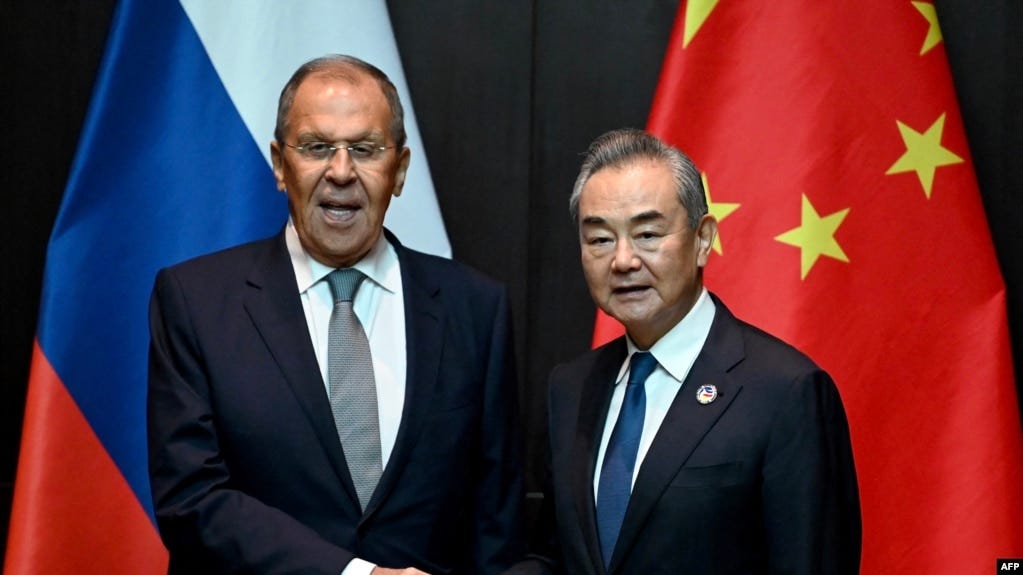
Wang Yi and Sergei Lavrov pledge to work on East Asian peace
BEIJING, July 26 (Reuters) - Chinese foreign minister Wang Yi said China and Russia should maintain communication and coordination on East Asian cooperation to promote regional peace and stability amid international turbulence.
Wang met with Russian Minister of Foreign Affairs Sergei Lavrov during an ASEAN summit in Laos on Thursday, where he also had a sideline meeting with India's foreign minister to ease tensions around a long-simmering border dispute.
In his meeting with Lavrov, Wang said in the face of a turbulent international situation and external interference and resistance, "China is ready to work with Russia to firmly support each other and safeguard each other's core interests," according to a statement from China's foreign ministry on Friday.
"Russia will work with China to support ASEAN centrality and prevent sabotage and interference by foreign forces," Lavrov said, according to the statement.
During a separate China, Russia and Laos trilateral foreign ministers' meeting in Vientiane, Wang also said "the world is entering a new period of turbulence and change, the international system is undergoing profound adjustments, and the global economic recovery is difficult."
He stressed that "regional conflicts have dragged on, and instability, uncertainty and unpredictability have permeated the world," according to a separate statement from the Chinese foreign ministry.
Wang is also expected to meet Japan Minister of Foreign Affairs Yoko Kamikawa on Friday. He is scheduled to attend several ASEAN meetings through Saturday.
Read more here.
China urges U.S. to manage risks, handle differences in relations
By CGTN (with input from Xinhua)
Chinese Foreign Minister Wang Yi on Saturday urged the United States to manage risks and handle differences in bilateral relations during a meeting with U.S. Secretary of State Antony Blinken.
Wang, also a member of the Political Bureau of the Communist Party of China (CPC) Central Committee, told Blinken that the two countries' diplomatic, financial, law enforcement and climate change teams, and the two militaries have maintained communication, and people-to-people exchanges have increased over the past three months.
"However, it must be pointed out that the U.S. side's containment and suppression of China has not been withdrawn, and instead has intensified," he said.
There are accumulating risks and rising challenges in China-U.S. relations, which are still at the critical juncture of stabilizing, said Wang.
"So it is necessary to continuously calibrate the direction of the relationship, manage risks, handle differences properly, remove interference and promote cooperation," he said.
Wang met Blinken on the sidelines of a series of meetings of foreign ministers of Southeastern and Eastern Asian countries in Vientiane, Laos, at the request of the top US diplomat.
China's policy towards the US has always been consistent, and China follows the principles of mutual respect, peaceful coexistence and win-win cooperation, said Wang.
The US side should translate US President Joe Biden's commitments into realities and return to a rational and pragmatic China policy, he said.
Both sides should work together to promote the stable, sound and sustainable development of China-US relations, said Wang.
Wang and Blinken last met in April during the latter's visit to China.
On the U.S.'s wrong perception of China
During Saturday's meeting, Wang said that the U.S. adheres to the wrong perception of China and always mirrors China with its own hegemonic logic.
He that China is not the United States, nor does it want to be, and China does not seek hegemony or power politics, and it has the best record on peace and security as a major country in the world.
Wang said that the third plenary session of the 20th Central Committee of the Communist Party of China (CPC) adopted a major decision to further comprehensively deepen reform and promote Chinese modernization, and China will stay true to its original aspiration and stay focused on pursuing happiness for the Chinese people and rejuvenation for the nation.
China will stay committed to the path of peaceful development and build a community with a shared future for mankind, Wang said, expressing hope that the U.S. side can understand the CPC and China's present and future from this decision.
On the Taiwan question
During the meeting, Wang told Blinken that Taiwan is part of China, and it has never been, and will never be, a country.
"Taiwan independence" is incompatible with peace in the Taiwan Straits, he said.
"We will counter every provocation by the 'Taiwan independence' forces, reduce the space for 'Taiwan independence,' and work toward the goal of a complete national reunification," said Wang.
On Ren’ai Jiao in the South China Sea
Wang also urged the U.S. not to stir up trouble and undermine maritime stability regarding China's Ren'ai Jiao in the South China Sea.
Wang said China has reached a temporary arrangement with the Philippine side to manage the situation, and the Philippines should honor its commitments to refrain from sending construction materials to its illegally grounded vessel at China's Ren'ai Jiao.
On the Ukraine crisis
Wang said that China's position on the Ukraine issue is candid and it will continue to promote peace talks.
The US should stop indiscriminate unilateral sanctions and long-arm jurisdiction, he said.
China opposes smears and planted evidence, does not accept pressure and blackmail, and will take resolute and forceful measures to safeguard its major interests and legitimate rights, Wang said.
What did Blinken say?
For his part, Blinken said the US side is committed to stabilising US-China relations, and adheres to the one-China policy.
The U.S. looks forward to maintaining regular communication with China for cooperation in anti-drug efforts, artificial intelligence and other fields, he said.
He added that the US side is willing to manage differences with China and avoid misunderstandings and miscalculations.
Read more here.
Mahoney on ASEAN Foreign Ministers Summit
Featured contributor Prof. Josef Gregory Mahoney was interviewed by Ziwen Zhao for his piece with Josephine Mair at the South China Morning Post #scmp on Anthony Blinken and Wang Yi meeting in #laos and what might be on their agenda.
The political situation in the White House is fraught given Trump's position in the race and Biden's withdrawal. While it's possible that Harris might win and even that Blinken might continue as Secretary of State, change is coming regardless. lt’s not uncommon for major powers to have candid conversations about such developments in order to ensure there's less uncertainty and potential flashpoints such as power transfers. We can recall that before Xi was first elected he visited Washington, so these types of encounters often happen before and after transfers to improve mutual understanding.
We know there is a great deal of anxiety around the world now about the US election, and we know either side might be nervous and unnecessarily reactionary. Both might see this and an opportunity to advance agendas against each other. Therefore having frank conversations might be wise.
Alternatively, it's possible Blinken wants to talk about the two diplomatic developments China has recently advanced, including reconciling the Palestinians factions and hosting Ukrainian FM Kuleba. These developments touch on matters of concern for the White House, and hearing about it first hand from Wang Yi is something Blinken would want..
There are always many things for them to discuss, but these would be the most relevant given recent events. Their meeting in Laos is good because Beijing is very cautious about showing favouritism or special recognition to either US party now.
Their meeting in Laos helps avoid that.
NB: Dr. Josef Gregory Mahoney is Professor of Politics and International Relations at East China Normal University (ECNU/华东师范大学).




